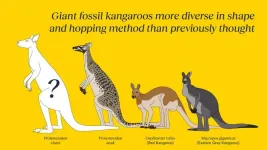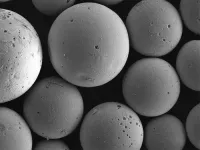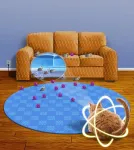(Press-News.org) With an increasing number of space missions targeting various celestial bodies, including Mars, Europa, and the Moon, the importance of maintaining the integrity of these environments while protecting our own biosphere has never been greater. The ICPPW will serve as a platform for promoting international collaboration and knowledge exchange on best practice in planetary protection.
The event will feature a range of sessions, meetings, as well as panel discussions, covering key topics such as the current and future landscape of planetary protection, implementation of planetary protection requirements, the limits of life, sample return, and examining specific categories for Mars and icy worlds. Space agencies, including CNSA, ESA, ISRO, JAXA, NASA, and UAE Space Agency, will be reporting on their exploration to different bodies in the Solar System, and during the week representatives will give a briefing on their planetary protection activity. Industry and the commercial sector will also be present and taking part. In-person and online participants will therefore have the opportunity to interact with major stakeholders in the exploration and planetary protection field, share insights, and forge the partnerships that are vital in developing sustainable space exploration missions.
"We are excited to hold the Inaugural International COSPAR Planetary Protection Week in collaboration with the UK Space Agency," said Professor Pascale Ehrenfreund, President of COSPAR. "This event represents a significant milestone in our collective efforts to ensure the responsible exploration and preservation of celestial bodies for future generations.”
COSPAR Chair of the Panel on Planetary Protection, Dr Athena Coustenis, said “By bringing together experts from across disciplines and borders, we hope to ensure a sustainable and safe exploration of our neighbourhood and to catalyze new ideas and initiatives that will shape the future of planetary protection."
The Open University’s Professor Karen Olsson-Francis, the UKSA’s representative on the COSPAR Panel on Planetary Protection, said, “We are delighted to host this inaugural event, demonstrating the UKSA’s commitment to ensuring space is used and explored in sustainable and responsible ways.”
The collaboration with UKSA and the other 11 space agencies represented in the COSPAR Panel on Planetary Protection underscores the interest of all stakeholders and the need for coordination among them to ensure consensus on the preservation of scientific exploration. By bringing together international stakeholders, the Inaugural ICPPW aims to spur advancements in planetary protection requirements.
As this issue is of growing interest to wider society, a public outreach panel is organised for the evening of 25 April at the Geological Society of London.
The Inaugural COSPAR International Planetary Protection Week will take place at the Royal Society in London, UK and online. Registration for online places at the event is now open. For more information, interested parties are invited to register here.
For media inquiries, please contact:
Leigh Fergus, leigh.fergus@cosparhq.cnes.fr and
Hannah Cooper, PlanetaryProtection@open.ac.uk
Note to Editors
COSPAR, the Committee on Space Research, was created in 1958, at the dawn of the space age, under the aegis of the International Council of Scientific Unions, now the International Science Council (ISC). COSPAR’s objectives are to promote on an international level scientific research in space, with emphasis on the exchange of results, information and opinions, and to provide a forum, open to all scientists, for the discussion of problems affecting space research. In its first years of existence as an entity that ignores political considerations and views all questions solely from the scientific standpoint, COSPAR played an important role as an open bridge between East and West for cooperation in space. When this role became less prominent with the end of the Cold War, COSPAR focused its objectives on the progress of all kinds of research carried out with the use of space means.
COSPAR has played a central role in the development of new space disciplines such as life sciences and fundamental physics in space, by facilitating the interaction between scientists in emerging space fields and senior space researchers. Another recent inclusion in our portfolio concerns social sciences and humanities, which aims to provide opportunities for COSPAR to engage with SSH communities, including in the education area, and gives a role to our organization that is commensurate with today’s interaction of space matters with the broader society.
A recent emphasis is the development of tighter bonds between science and industry, through the establishment of the Committee on Industry Relations, grouping 18 major aerospace companies worldwide, and advising COSPAR on how best to integrate the capabilities of industry into COSPAR’s activities and by doing so, to best serve the interests of industry and science in a synergistic way.
COSPAR strives to promote the use of space science for the benefit of humanity and for its adoption by developing countries and new space-faring nations, in particular through a series of Capacity Building Workshops which teach very practical skills enabling researchers to participate in international space research programs.
COSPAR advises, as required, the United Nations and other intergovernmental organizations on space research matters and on the assessment of scientific issues in which space can play a role, for example the Group on Earth Observations (GEO), in which COSPAR is a Participating Organization.
COSPAR fulfils its responsibilities to provide accepted guidelines on planetary protection to guide compliance with the 1967 Outer Space Treaty and other international agreements. This is managed through the work of the COSPAR Panel on Planetary Protection.
Lastly, COSPAR is the key entity worldwide in terms of developing, maintaining and promulgating clearly delineated policies and requirements as to the standards that must be achieved to protect against the harmful effects of biological interchange in the conduct of solar system exploration and use.
COSPAR Social Media:
COSPAR webpage: cosparhq.cnes.fr/
LinkedIn: Committee on Space Research - COSPAR
Facebook: Committee on Space Research
X: @CosparHQ
YouTube: @COSPAR
Instagram: @CosparHQ
Mastodon: @astrodon.social cosparhq
About Open University
The Open University is the largest academic institution in the UK and a world leader in flexible distance learning. Since it began in 1969, the OU has taught more than 2 million students worldwide. There are over 170,000 current students, including more than 15,000 overseas. The Open University’s mission to be open to people, places, methods and ideas is delivered through its values of inclusivity, innovation and responsiveness.
Within its mission it states a commitment to create world-class research. AstrobiologyOU (Director, Prof Olsson-Francis) is a multidisciplinary research group working collaboratively to address the scientific, governance and ethical challenges associated with the advancement of astrobiology and related space exploration missions. The group are based at The Open University campus in Milton Keynes, UK, with their staff and laboratory infrastructure supported by funding from UKSA and the UK Research and Innovation’s research councils, including Research England, who provided £6.7 million to facilitate the group’s expansion. Planetary Protection is one of the group’s major research themes.
AstrobiologyOU and The Open University’s research is widely disseminated to the public, through courses on our free learning platform OpenLearn, and for over 50 years the OU has produced programmes with the BBC, designed to engage millions of viewers and listeners with entertaining, informative and educational content. OU academics are consultants on these programmes, providing expert insight and research-based contributions.
About UK Space Agency
The UK Space Agency plays a major role in delivering the UK government’s National Space Strategy by catalysing investment into the space sector, delivering missions and capabilities, and championing space for the benefit of life on Earth.
Our way of life on Earth depends on space. Satellites forecast the weather, keep businesses connected and products moving, and monitor our natural environment. They underpin the UK’s economy and support our critical national infrastructure.
To achieve the greatest impact, the Agency focuses most of its resource behind eight delivery Priorities. These are:
launch: supporting satellite launch services from UK spaceports
sustainability: taking a leading role in keeping space safe and accessible now and in the future
discovery: supporting space science and exploration missions
innovation: investing in bold new technologies
levelling-up: boosting space investment and jobs across the country
Earth observation: studying our planet to drive discovery and tackle climate change
low-Earth orbit: delivering vital everyday satellite services
inspiration: inspiring new space customers, investors and the next generation END
Inaugural International COSPAR Planetary Protection Week: Set to inspire global collaboration in London
2024-04-15
ELSE PRESS RELEASES FROM THIS DATE:
A quarter of deaths among young adults in Canada were opioid related in 2021
2024-04-15
Premature deaths related to opioids doubled between 2019 and 2021 across Canada, with more than 1 in 4 deaths among young adults aged 20–39 years attributable to opioids, according to new research published in CMAJ (Canadian Medical Association Journal) https://www.cmaj.ca/lookup/doi/10.1503/cmaj.231339.
Opioid-related deaths have continued to increase over the past decade across Canada, with 6222 deaths occurring in 2021. This trend worsened during the COVID-19 pandemic, although the scale and rapidity of increases varied across provinces and territories. ...
Severe morning sickness: how to diagnose and treat
2024-04-15
Severe morning sickness in pregnancy, known medically as hyperemesis gravidarum, can negatively affect both maternal and infant health. A review published in CMAJ (Canadian Medical Association Journal) https://www.cmaj.ca/lookup/doi/10.1503/cmaj.221502 provides information to clinicians on the causes, diagnosis, and treatment of the condition.
Although nausea and vomiting are common in pregnancy, affecting as many as 70% of pregnancies, severe vomiting and nausea can prevent people from eating and drinking sufficiently, leading to weight loss and ...
Digging up new species of Australia and New Guinea’s giant fossil kangaroos
2024-04-15
Palaeontologists from Flinders University have described three unusual new species of giant fossil kangaroo from Australia and New Guinea, finding them more diverse in shape, range and hopping method than previously thought.
The three new species are of the extinct genus Protemnodon, which lived from around 5 million to 40,000 years ago – with one about double the size of the largest red kangaroo living today.
The research follows the discovery of multiple complete fossil kangaroo skeletons from Lake Callabonna in arid South Australia in 2013, 2018 and 2019. These extraordinary fossils allowed lead researcher ...
Carbon beads help restore healthy gut microbiome and reduce liver disease progression
2024-04-15
Innovative carbon beads, invented by researchers at UCL, reduce bad bacteria and inflammation in animal models, which are linked to liver cirrhosis and other serious health issues.
The study, published in Gut, found that the carbon beads, licensed to UCL-spinout Yaqrit, were effective in restoring gut health and had a positive impact on liver, kidney and brain function in rats and mice. They were also found to be safe for human use.
The next step will be to see if the same benefits can be realised in humans, which would ...
School suspensions and exclusions put vulnerable children at risk
2024-04-15
Managing problematic student behaviour is one of the most persistent, challenging, and controversial issues facing schools today. Yet despite best intentions to build a more inclusive and punitive-free education system, school suspensions and expulsions remain.
Now, new research from the University of South Australia shows that exclusionary practices not only fail to identify the deep-rooted causes of challenging student behaviours but exacerbate negative issues rather than resolve them.
Lead researcher, UniSA’s Professor Anna Sullivan, says schools face difficult decisions around ...
Tuberculosis can have a lasting impact on the lung health of individuals who have been successfully treated for the disease
2024-04-15
Finding strongly indicates that post-TB lung disease is an under-recognised global challenge, UK researchers say
**Note: the release below is a special early release from the ESCMID Global Congress (formerly ECCMID, Barcelona, Spain, 27-30 April). Please credit the congress if you use this story**
**ECCMID has now changed name to ESCMID Global, please credit ESCMID Global Congress in all future stories**
New research being presented at this year’s ESCMID Global Congress (formerly ECCMID) in Barcelona, Spain (27-30 ...
Untangling dreams and our waking lives
2024-04-14
Sunday, April 14, 2024 - Toronto - “Dreams are messages from the deep.” (Dune Part 1) Musings about dreams abound throughout society, from movies to TV to books. But despite being a constant source of fascination, the role of dreams in our lives still remains elusive. As recently noted in the TV show Grey’s Anatomy: “Honestly, no one knows why we dream or why we have nightmares.” While true, neuroscientists are finding innovative new ways to study dreams and how they influence our cognition.
“Understanding how dreams are generated and what their function might be — if any — is one of science's ...
Important health information missing in online food delivery menus
2024-04-14
A University of Sydney study investigating menu items on major online food delivery outlets and applications (apps) in Australia has found most advertised items are missing nutritional information that would otherwise help consumers make healthy choices.
Researchers say the findings show this information is largely absent or poorly provided on online food retail platforms and menu labelling laws need to keep up with increasing demand of online food delivery services.
The 2011 New South Wales Menu Labelling Scheme require large fast-food outlets to display both the average energy content (as Kilojoules) on menu items and the reference statement ‘the ...
UK/Portuguese study strongly suggests antibiotic-resistant “superbugs” are being passed from cats and dogs to their owners
2024-04-13
Finding highlights the importance of including pet-owning households in surveillance programmes for antibiotic resistance
**Note: the release below is a special early release from the ESCMID Global Congress (formerly ECCMID, Barcelona, Spain, 27-30 April). Please credit the congress if you use this story**
**ECCMID has now changed name to ESCMID Global, please credit ESCMID Global Congress in all future stories**
Pet dogs and cats play an important role in the spread of antibiotic-resistant bacteria, new research be presented at the ESCMID Global ...
Researchers study effects of solvation and ion valency on metallopolymers
2024-04-12
In a new paper published in JACS AU, researchers at the University of Illinois Urbana-Champaign analyzed the effects of solvation and ion valency on metallopolymers, with implications for critical materials recovery and recycling, and environmental remediation.
Chemical and biomolecular engineering (ChBE) professor Xiao Su led the research, which explored the science behind the selectivity “preferences” of monovalent and divalent anions towards redox polymers. In other words, why – when electrodes are coated with redox polymer films and potential is applied – one ion prefers the redox polymer while ...


